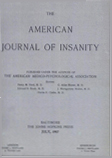Abstract
A study of four family complexes in eastern Long Island, south-western Connecticut, south-central Connecticut and eastern Massachusetts which show nearly a thousand cases of Huntington's chorea yields the remarkable result that practically all can be traced back to some half-dozen individuals, including three (probable) brothers who migrated to America during the 17th century. But, already, numerous "biotypes" having specific and differential hereditary behavior have appeared. Thus there is a biotype in which the tremors are absent, but mental deterioration present; a biotype in which the tremors are not accompanied by mental deterioration; a biotype in which the chorea does not progress; and a biotype in which the onset of the choreic movements is in early life. In general, the symptomatology of chronic chorea is dissimilar in different strains of families. The age of onset, the degree of muscular involvement, the extent of mental deterioration all show family differences and enable us to recognize various species, or biotypes, of the disease. These biotypes are less striking than they would be were it not for the extensive hybridization that is taking place between biotypes in random human matings.
The method of inheritance of some of the elements of Huntington's chorea has been worked out. In general, the choreic movements never skip a generation and in other respects show themselves clearly to be a dominant trait. The mental disorder is usually of the hyperkinetic or manic type and this also shows itself as a dominant. The age of onset apparently tends to diminish in successive generations—"law of anticipation"—but this is partly, if not wholly, illusory and is due to the fact that in comparing the age of onset in grandfathers with that in grandchildren we are not comparing on the same basis, for the grandparents are a selected lot (selected on the basis of late onset—at least late enough for them to become parents), while grandchildren include those in whom the onset is so early in life that they will never marry.
Among the 3000-odd relatives of the 962 choreics studied, many nervous traits are recorded. Thus, epilepsy is recorded 39 times, infantile convulsions 19 times, meningeal inflammations and brain fever 51 times, hydrocephaly 41 times, feeble-mindedness 72 times, [See table in the PDF file] Sydenham's chorea 11 times, and tics 9 times, mostly in one small family. This incidence, which would seem high for an unselected population, suggests that chorea occurs in families characterized by a general liability to nervous and mental troubles.
[See figure in the PDF file]
Though it can be shown that the 962 cases of chorea originated from six or seven ancestors and that the tendency has been handed down almost without a break through the generations and that for generations there have been individuals who recognized the hereditary nature of the disease and were influenced in marriage accordingly; nevertheless, there is no clear evidence that persons belonging ing to the choreic lines voluntarily abstain to any marked degree from, or are selected against, in marriage.

